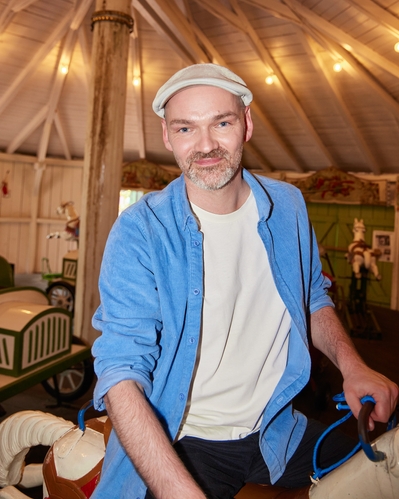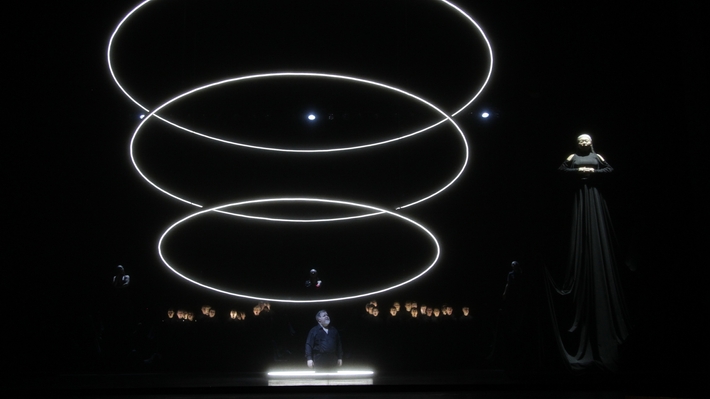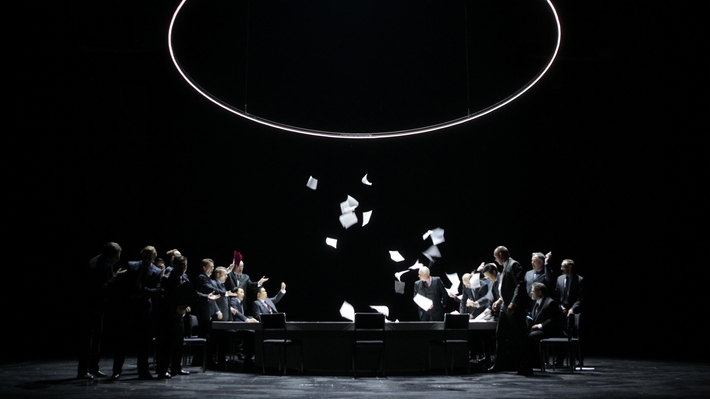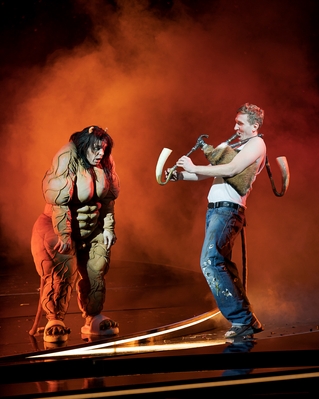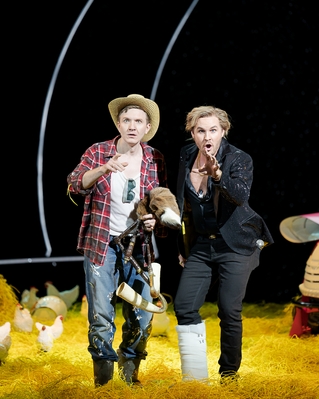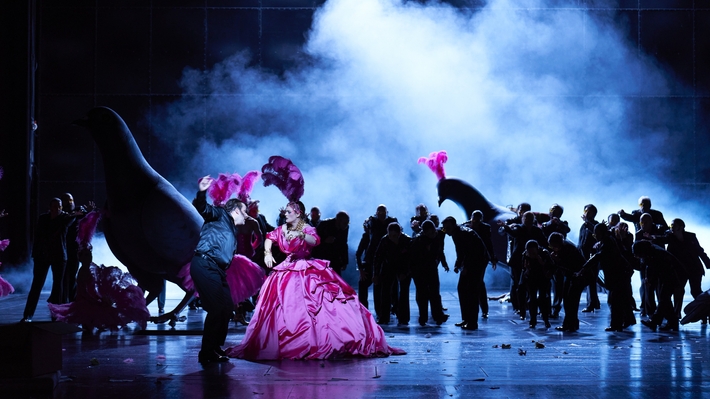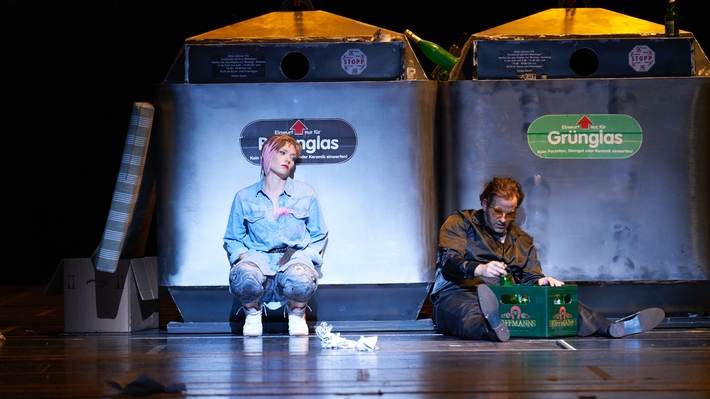A Great Team Player in Musical Theater
News |
Director Dirk Schmeding has been attracting sustained attention in the German-speaking music theater landscape for some time now.
In Austria, too, he is anything but an unknown since his extremely successful productions of Schwanda, der Dudelsackpfeifer and Venus in Seide at the Graz Opera House and Die stumme Serenade at the Theater an der Wien: Schmeding is now looking forward to his state opera debut with Smetana's Bartered Bride.
Since his first encounter with this opera as a student and opera novice, he has felt gripped by its irrepressible vitality, says Schmeding. At the same time, the work is imbued with a melancholy that is never sentimental or pathetic, but wise and just as "life-like" as the comedies of Shakespeare and Mozart.
On the following pages, we will introduce you to three of his productions from recent years in words and pictures. Sergio Morabito, former chief dramaturge of the Vienna State Opera, has followed Schmeding's work continuously since its beginnings in Weimar and Stuttgart.
In summer 2019, Schmeding staged Guercœur by Albéric Magnard (1865-1914) at Theater Osnabrück. This was the first staged revival of the opera since its posthumous premiere in Paris in 1931. The work is remarkable in its combination of spirituality and concrete political hope for the here and now. It is quite understandable that Guercœur was hailed by critics as the "work of the hour" on the occasion of the new production in Osnabrück. Magnard took a stand against reaction and chauvinism as a convinced republican and European.
The play tells the story of a republican freedom fighter's path to purification. In the first act, Guercœur protests against his death in the afterlife and is finally sent back to life by the allegory of Vérité (truth), not least through the intercession of Souffrance (suffering), as he had never encountered suffering on his victorious journey through life. Two years have passed since his death, but the world is no longer the one he had left: his beloved Giselle has broken the promise of loyalty she made at his deathbed in favor of his former political foster son Heurtal. Heurtal has degenerated into a cynical populist and is now preparing to undermine Guercœur's emancipatory legacy. In the turmoil of the power struggle, Guercœur falls and enters the afterlife again, this time having comprehensively failed. There, the Vérité promises the utopia of a future liberated society, including the words: "The mixing of races and languages will give mankind a culture of peace."
The composer (like many French composers) was most taken with Parsifal. Echoes of its accents of suffering, sublime redemptive poetry and delicately shrouded, impressionistic early spring characterize the score, which was composed between 1897 and 1900. (You should definitely listen to the 1987 recording under Michel Plasson)
Osnabrück has impressively mastered this large-scale work with great commitment on all levels. In addition to the ensemble of soloists, the choir also did justice to its tasks both in the archaic, almost liturgical framing acts and in the action choruses of the second act - as did the orchestra, which was perhaps only unable to meet the required late-romantic sonority at every moment due to the reduced size of the ensemble.
Dirk Schmeding and his team (stage: Martina Segna, costumes: Frank Lichtenberg) proceeded with great visual imagination and imaginative, playful lightness, which repeatedly led to cleverly placed refractions. In the contemplative third act, Schmeding counterpointed the invoked utopia first with Guercœur's attempts at reanimation, then the issuing of his death certificate and the laying out and cremation of the man who had died for the second time and now violently.
Schmeding obviously had his actors instructed by a team of emergency doctors and a professional cremator, as the artistic director Ralf Waldschmidt confirmed to me after the performance: "Gestural precision as a prerequisite for aesthetic acuity and validity. The national critics rightly spoke of a "scenically rigorous realization that never betrays the spirit and intentions of the play".
Schmeding's production was voted "Rediscovery of the Year" in the Opernwelt critics' poll and nominated for the International Opera Awards 2020.
Svanda dudák followed in Graz in December 2021 as a Schmeding premiere. This "dance on the volcano" of Czech-Bohemian national music, premiered in Prague in 1927, which - via the notorious detour of a German Max Brod adaptation as Schwanda, der Dudelsackpfeifer - became a worldwide success (Vienna State Opera, Covent Garden, Met ..), shortly before the Nazis banned the work of Jaromír Weinberger, the Czech with Jewish roots, from the repertoire in order to invade his country in 1938, the director and his team have brought it to the stage as an opulent and intelligently witty revue.
Even on an extremely stylized stage, the director succeeded in telling the touching love triangle between the peasant bagpipe virtuoso, his newlywed Dorotka and Babinsky - a Bohemian Robin Hood who, as an agent provocateur, seduces the two Czech country bumpkins on a journey "from heaven through the world to hell" - in a concrete, vivid, differentiated and lovingly accurate way.
He was even able to playfully animate and authenticate full-body costumes (such as the penguins that form the court of the Ice Queen or the withered flesh of the Prince of Hell). The performance countered the folklore overkill of the score with a spirited imagination.
Not the fast-paced polkas, furiants and ozdemeks - in which Weinberger, a pupil of Max Reger, displays his instrumental and contrapuntal compositional skills, culminating in a virtuoso orchestral fugue with which Schwanda heats up hell - but the sentimental, upbeat smarminess might not have been quite so bearable in a less brilliant production.
In my perception, Schmeding has developed an increasingly confident and freer theatrical language from performance to performance, which justifies high hopes.
In September 2023, Dirk Schmeding brought Offenbach's The Tales of Hoffmann to the stage at the Staatstheater Darmstadt. Together with Robert Schweer (stage), Britta Leonhardt (costumes) and choreographer Rachele Pedrocchi, he created a production that is both aesthetically daring and completely coherent. Schmeding proved to be a real team player, channeling the impulses of his performers in a rousing and precise manner.
The evening tells of the impossible relationship between Hoffmann, the boozy artist-narcissist genius, and his muse, who accompanies him through highs and lows. The stage: a crammed one-room apartment with a bed, mood board, sketch boxes and a man-sized fridge. The chorus of wine and beer spirits emerges from the fridge before the big HOFFMANN solo show begins - Hoffmann is both performer and audience, while the entire chorus celebrates his own superstar self in glitter jackets.
The muse remains an observer and repeatedly tries to pull Hoffmann back from the abyss of his hubris. Scenic details such as an oversized bottle opener as a balalaika, feathered stars, dead birds and huge dove sculptures provide sureal visual power and melancholy nuances. Schmeding succeeds in combining show effects and poetic moments without the production tipping over into mere showmanship.
Hoffmann's character is shown as an incorrigible dream dancer, similar to Mastroianni's roles in Fellini's films. As in Ginger and Fred, his life is reflected in the revue of his dreams. Schweer composes the décor of the inner acts from the alienated and multiplied elements of the household with the muse. The stage remains empty, a black hole above which Hoffmann's glittering comet tail sparks.
At the end, when all the doppelgangers have collapsed, two old glass containers descend - for brown and green glass. Hoffmann has rarely been "disposed of" so mercilessly. The muse manages to break away from her partner. He is stranded as a wreck in front of the containers, while the apotheosis sounds from off-screen: "Des cendres de ton cœur réchauffe ton génie".
The actors are particularly impressive: Solgerd Isalv (Muse/Nicklausse) with a magnetic presence, Matthew Vickers (Hoffmann) in peak physical form, Juliana Zara as the powerful Olympia, Megan Marie Hart with a dark timbred soprano as Antonia and Jana Baumeister (Giulietta) somewhat cooler in expression. The chorus was highly motivated and Daniel Cohen conducted the orchestra with style. The Guiraud recitative version in the new critical edition by Jean-Christophe Keck was performed for the most part.
Conclusion: Schmeding's Hoffmann is a production of rare balance - daring, playful, visually brilliant and at the same time deeply melancholic. An evening that impressively combines team spirit, imagination and scenic precision.
